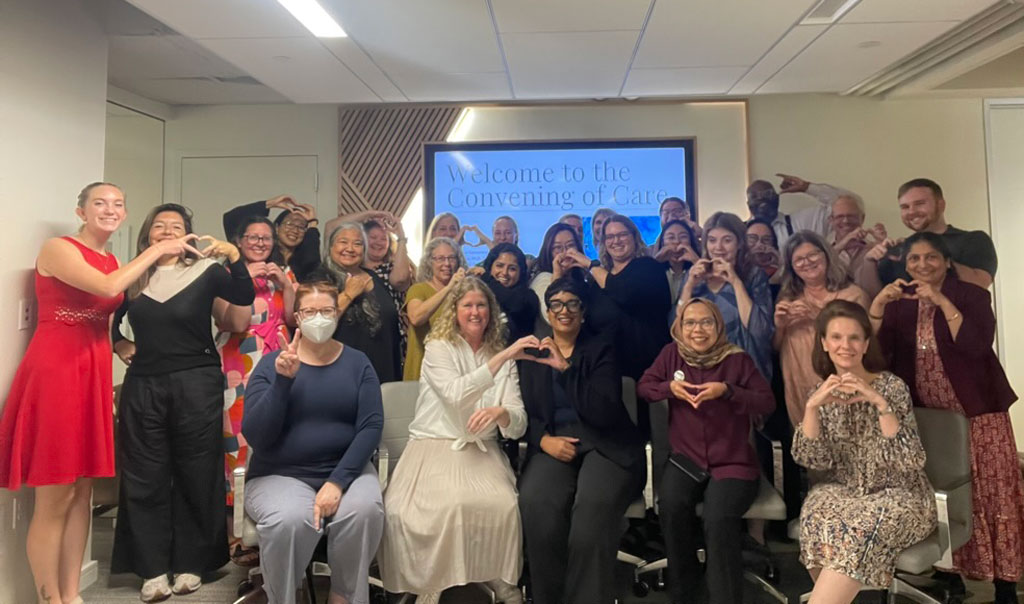Shifting the Research Enterprise: Embracing Care as a Strategy Forward

By Risha RaQuelle, AAG Chief Strategy Officer and
Emily Skop, Professor, University of Colorado, Colorado Springs


In the evolving landscape of academic research, initiatives for justice, equity, diversity, and inclusion (JEDI) have long been critical in advancing an inclusive, fair, and just research enterprise. These efforts, led by passionate advocates, have catalyzed significant progress in dismantling structural barriers and promoting diversity. However, as political and legislative challenges increasingly target JEDI initiatives, academic institutions need new strategies to continue this essential work.
The Convening of Care, held on September 19-20, 2024 and co-sponsored by the American Association of Geographers, the University of Colorado Colorado Springs, and the National Organization of Research Development Professionals with funding from the National Science Foundation, brought together research enterprise leaders, department heads, and early-career scholars to explore care as a way to navigate these challenges and advance inclusivity, even in the face of JEDI bans.
A key component of this convening was the formation of triads—collaborative groups made up of research enterprise professionals, academic department leaders, and early-career scholars. This triadic model allowed participants to exchange insights, reflect on their experiences, and collaboratively identify how care can be operationalized in their respective roles to foster a more inclusive and supportive research environment.
The Role of Triads in Reimagining Care
During the Convening of Care, triads were instrumental in guiding the discussions and exploring how care could complement the values promoted by JEDI. Bringing together individuals at different stages of their academic careers, with varied responsibilities and experiences, the triads created a unique space for cross-level collaboration. These groups examined how care, as a relational and ethical practice, could be infused into the day-to-day workings of research institutions.
The inclusion of research enterprise leaders, department heads, and early-career scholars ensured that a diverse range of perspectives was represented, offering insights into how care could be implemented at multiple levels of the academic and research enterprise. This triadic collaboration made it possible to address not only the policy and structural challenges but also the relational and cultural dynamics within academia.
The discussions within the triads focused on two central themes:
- The lived experiences of researchers and leaders navigating the research enterprise.
- Recommendations for how care can be embedded into research practices and leadership approaches.
Moving beyond traditional JEDI frameworks, which often focus on compliance and metrics, care encourages leaders to focus on the well-being of their researchers, emphasizing relational dynamics and mental health.”
Implications of Care for Research Enterprise Leaders
For research enterprise leaders, care introduces an instructive shift in how research environments are structured and supported. Moving beyond traditional JEDI frameworks, which often focus on compliance and metrics, care encourages leaders to focus on the well-being of their researchers, emphasizing relational dynamics and mental health. The triads identified that care could be embedded in leadership practices by:
- Developing care-based mentorship programs that prioritize the emotional and personal growth of researchers.
- Fostering transparent communication that acknowledges the challenges faced by underrepresented scholars and provides pathways to address these challenges without fear of retaliation.
- Creating support networks that allow researchers to thrive in environments where they feel valued, rather than merely meeting diversity quotas.
Department Leaders: Shaping Departmental Culture through Care
Department leaders play a critical role in shaping the day-to-day culture of research environments. For these leaders, care offers a way to move beyond policy mandates to create a department culture that genuinely supports diversity and inclusion through personal connection and understanding. Triads involving department heads explored how care could be integrated into department leadership by:
- Establishing listening sessions where faculty and students can voice their concerns and experiences in a supportive environment, ensuring that everyone’s voice is heard.
- Promoting inclusive department meetings where care is demonstrated through equitable participation and recognition of contributions from all members, especially those from underrepresented groups.
- Introducing well-being check-ins as part of regular departmental practices, helping to mitigate burnout and promote a healthier work-life balance for all scholars.
Early-Career Scholars: Building a Foundation of Care
For early-career scholars, many of whom face significant challenges navigating the complexities of the research enterprise, care provides a critical support system. The triads identified how care could serve as an essential tool in helping these scholars overcome barriers to inclusion, particularly in institutions where JEDI policies have been restricted. Key takeaways for early-career scholars include:
- Building peer support networks that emphasize mutual care and provide a safe space for sharing experiences, advice, and strategies for success.
- Advocating for mentorship models that not only focus on professional development but also on personal well-being, ensuring that early-career scholars are supported in all aspects of their academic journey.
- Encouraging collaborative research practices that prioritize equitable partnerships, sharing both the workload and recognition, and fostering an environment where scholars can grow together.
TLC GRAM: A Framework to Operationalize Care Across Roles
The triadic collaboration also paved the way for a broader discussion on how care could be operationalized through the TLC GRAM framework as part of AAG’s JEDI implementation, the TLC GRAM framework was presented during the Convening of Care. The framework’s elements—Training, Listening, Communication, Governance, Reports, Advocacy, and Membership—provide a structured approach to embedding care in research organizations at every level.
The triads identified key areas where TLC GRAM could guide their efforts:
- For research enterprise leaders, TLC GRAM offers a way to integrate care into leadership training and governance, ensuring that decisions prioritize well-being and relational dynamics.
- For department heads, the framework provides tools for implementing listening practices and fostering transparent communication within departments, helping to create a supportive and inclusive culture.
- For early-career scholars, TLC GRAM can be a guide for advocating for care-based mentorship and creating collaborative research environments that prioritize equity and shared success.
While TLC GRAM builds upon the values of JEDI, it also allows institutions to transcend the limitations of JEDI language, making care the central focus of their inclusivity efforts.
The Path Forward: Care as a Strategy for Inclusive Research
The triadic collaboration during the Convening of Care demonstrated that care is more than just a complementary approach to JEDI: it is a powerful strategy for moving forward in the face of JEDI bans. Through the insights and experiences shared in triads, it became clear that care provides a more flexible and relationally grounded approach to fostering inclusivity, one that can be applied at every level of the research enterprise.
By focusing on care, institutions can continue to promote equity and inclusion even in politically challenging contexts. Research enterprise leaders, department heads, and early-career scholars all have a role to play in operationalizing care through the TLC GRAM framework, ensuring that academic environments remain supportive, inclusive, and just—regardless of external political pressures.
Learn more about the outcomes of the Convening of Care and next steps for implementing care-based practices through the TLC GRAM framework.
The Convening of Care project is supported by the National Science Foundation under Award No. 2324401 and Award No. 2324402. Any opinions, findings and conclusions or recommendations expressed in this material are those of the author(s) and do not necessarily reflect the views of the National Science Foundation.
The AAG Culture of Care column is an outreach initiative by the AAG JEDI Committee. Don’t forget to sign up for JEDI Office Hours.

